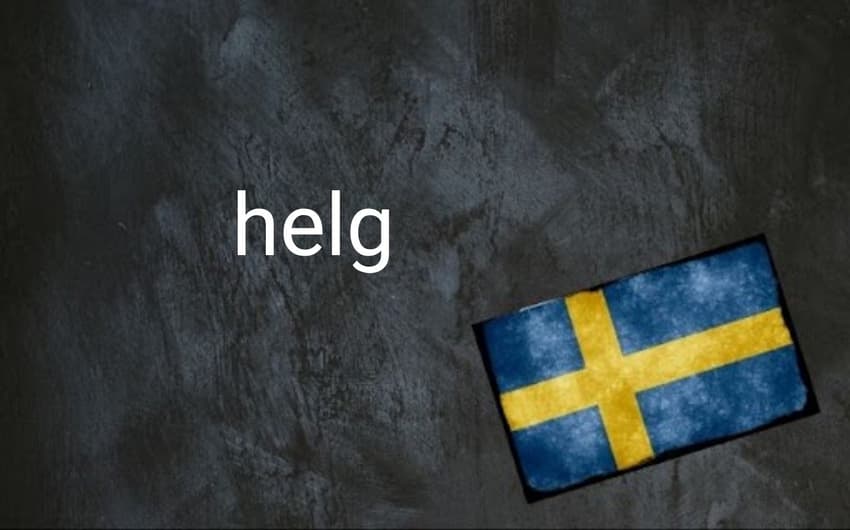Swedish word of the day: helg

Today's word of the day is useful when bidding colleagues goodbye on a Friday afternoon.
En helg means "a weekend" in Swedish. You can also use the terms veckoslut, literally meaning "weekend", but helg is by far the most common. I helgen means "at the weekend" and can be used in both past and future tense, while på helgen means "at the weekend" in present tense, to refer to something that happens every weekend.
You'll also hear this word in the phrase trevlig helg when saying goodbye to people on a Friday. And it's incorporated into other constructions, such as helgmat (weekend food), helgmys (weekend cosiness), helgresa (weekend trip) and so on.
The English term "weekend" is also used in Swedish and has been since the 1980s, but it has a slightly different sense. When Swedes refer to a "weekend" rather than en helg, they usually mean an experience that's out of their usual routine, such as a trip away or a special experience.
Helg can also be used to refer to national holidays or festivals, including religious ones: it comes from the Old Norse helgr (plural helgar), which was used to refer to holy festival days and was related to the words heilagr (holy) and helga (to hallow).
Swedish also has the word helgdag, referring to national or religious holidays, which has the same etymological roots as English "holiday" and Norwegian/Danish helligdag. Danish, however, uses the term "weekend" to refer to Saturday and Sunday in order to keep a distinction between regular weekends and holidays.
In Swedish, helgdagar are also called röda dagar (red days) and include Midsummer, Christmas, and New Year's Eve for example.
Around these special holidays, but particularly the Christmas and New Year period, you'll hear the greeting god helg meaning roughly "happy holidays" or "happy festive season", as an alternative to god jul! (Merry Christmas). But it's not a modern invention, and is recorded as far back as the 1880s.
Examples
Är det helg än?
Is it the weekend yet?
Vad har du gjort i helgen?
What did you do over the weekend?
Comments
See Also
En helg means "a weekend" in Swedish. You can also use the terms veckoslut, literally meaning "weekend", but helg is by far the most common. I helgen means "at the weekend" and can be used in both past and future tense, while på helgen means "at the weekend" in present tense, to refer to something that happens every weekend.
You'll also hear this word in the phrase trevlig helg when saying goodbye to people on a Friday. And it's incorporated into other constructions, such as helgmat (weekend food), helgmys (weekend cosiness), helgresa (weekend trip) and so on.
The English term "weekend" is also used in Swedish and has been since the 1980s, but it has a slightly different sense. When Swedes refer to a "weekend" rather than en helg, they usually mean an experience that's out of their usual routine, such as a trip away or a special experience.
Helg can also be used to refer to national holidays or festivals, including religious ones: it comes from the Old Norse helgr (plural helgar), which was used to refer to holy festival days and was related to the words heilagr (holy) and helga (to hallow).
Swedish also has the word helgdag, referring to national or religious holidays, which has the same etymological roots as English "holiday" and Norwegian/Danish helligdag. Danish, however, uses the term "weekend" to refer to Saturday and Sunday in order to keep a distinction between regular weekends and holidays.
In Swedish, helgdagar are also called röda dagar (red days) and include Midsummer, Christmas, and New Year's Eve for example.
Around these special holidays, but particularly the Christmas and New Year period, you'll hear the greeting god helg meaning roughly "happy holidays" or "happy festive season", as an alternative to god jul! (Merry Christmas). But it's not a modern invention, and is recorded as far back as the 1880s.
Examples
Är det helg än?
Is it the weekend yet?
Vad har du gjort i helgen?
What did you do over the weekend?
Join the conversation in our comments section below. Share your own views and experience and if you have a question or suggestion for our journalists then email us at [email protected].
Please keep comments civil, constructive and on topic – and make sure to read our terms of use before getting involved.
Please log in here to leave a comment.